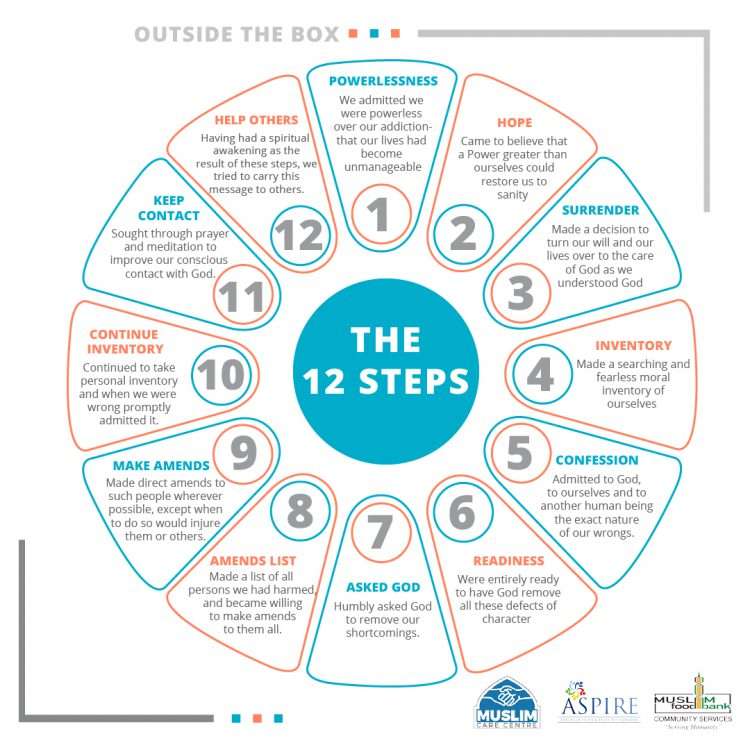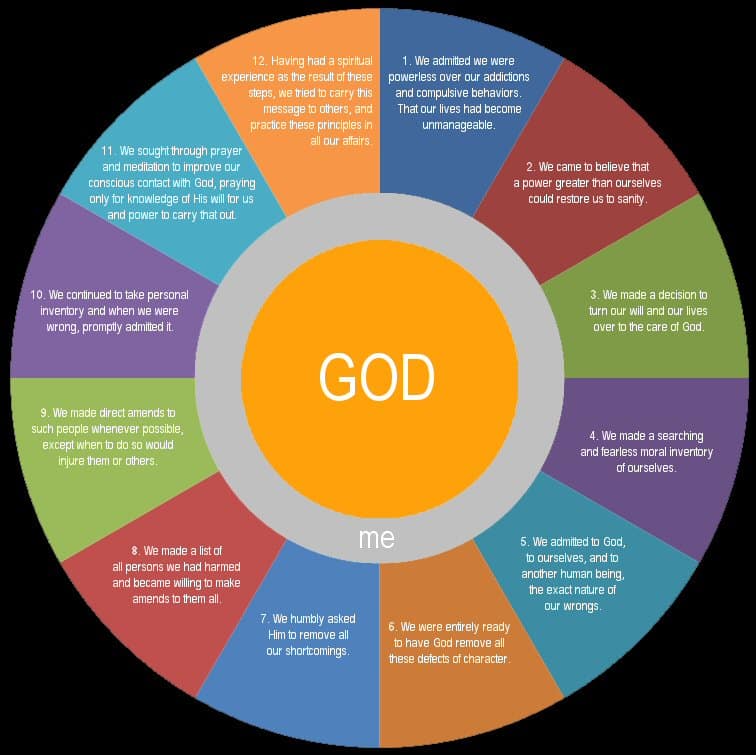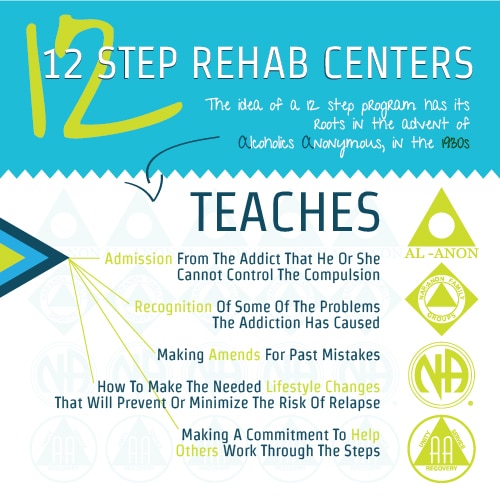How The 12 Steps Works
Like any solid plan, every part has its purpose.
The 12 Steps are intended to be followed in sequence and in their entirety. You may not like all of them. Some will be more challenging than others. But they are all crucial in your long term success.
Each step represents a unique challenge. Tackle them at your own pace with the support of a sponsor. Group therapy and 12 step support groups can also helpwhether you need accountability, fellowship, or simply a listening ear.
Just remember, there are twelve steps for a reason.
The Effectiveness Of 12
Many organizations associated with addiction support recognize 12-step programs as a form of evidence-based treatment, and research has shown that these programs can help people abstain from drugs or alcohol.
People who participate in 12-step programs generally reduce their drug intake when compared with those who do not use self-help groups. In fact, many psychologists say that treating individuals with similar problems in a group setting is the most effective form of treatment, according to a report by the Connecticut Department of Mental Health and Addiction Services.
Early involvement in 12-step programs can result in reduced substance use, according to numerous studies cited in a 2013 report published in the journal Social Work in Public Health. However, the authors noted that attendance in these support groups remains low and inconsistent.
What Is The 12
The 12-Step program, first developed and used by Alcoholics Anonymous, is a 12-step plan in order to overcome addictions and compulsions. The basic premise of this model is that people can help one another achieve and maintain abstinence from substances of abuse, but that healing cannot come about unless people with addictions surrender to a higher power. This higher power doesnt need to be a traditional Christian version of God it can be as simple as the community of the 12-step meetings, the universe, or a different version of a higher power fit for your type of spirituality.
The 12-Step movement can be a powerful and helpful force for many people, but some people struggle with what they interpret as a strong religious element of the program. Many addiction treatment programs offer alternatives to 12-Step methodology for those who prefer a more secular foundation for treatment.
American Addiction Centers is in-network with many insurance companies, and your addiction treatment can be free depending on your policy. Find out if you are covered below.
You May Like: How To Overcome Addiction With God
Food Addicts In Recovery Anonymous
Food Addicts in Recovery Anonymous is a 12-step program that defines food addiction as the inability to abstain from certain foods, despite the negative effects it can have on the individual. While many members of the group struggle with overeating, Food Addicts in Recovery Anonymous allows individuals with any symptoms to attend meetings, including purging, undereating, compulsive diet or exercise, obsession with food or weight or depression due to food, weight and body image.
Does American Addiction Centers Offer 12 Step Programs

Yes, most American Addiction Centers rehab locations integrate some 12-step ideology into their program model in the form of optional 12-step groups, because this does seem to be a helpful and effective supplemental modality for many clients. To learn more about our treatment centers that offer 12-step programs and meetings, call .
Read Also: How To Get Away From Sugar Addiction
The 12 Steps With Other Treatments
According to the National Institute on Drug Abuses Principles of Drug Addiction Treatment: A Research-Based Guide, short-term residential programs developed the idea of using a modified 12-Step approach to provide a shorter stay in treatment that included follow-up through a 12-Step fellowship.9 This is seen as a way to provide the important post-treatment structure that helps people maintain long-term recovery. Other programs have also incorporated the 12 Steps, both by encouraging clients to attend 12-Step fellowship meetings, and by incorporating 12-Step ideas into their practices.
While 12-Step facilitation programs dont necessarily follow the steps, they promote the use of a 12-Step methodology, in the hope that clients will move to a 12-Step program after rehab to help maintain sobriety. In addition, certain treatment centers base their model for service around some of the ideas promoted through the 12-Step program. These centers can offer research-based services and promote a more scientific understanding of addiction treatment, but they incorporate some of the spiritual, psychological, and practical practices that the 12-Step program promotes. This results in an encompassing model of care designed to support clients through rehab and to give tools that they can use after treatment to maintain their recovery for the long-term.
Prescription Drug Addiction: Treatment And Rehab
Many prescription medications have the potential to become drugs of abuse, if they are misused. Misuse of prescription drugs means taking them other than prescribed. This includes taking a larger dose, using them more frequently, or taking them for …
program12-StepforAddictionfor
Don’t Miss: How To Talk To An Addict In Denial
What Types Of 12
There are many 12-step treatment programs available for various addictions and compulsive behaviors, including:
- Alcohol, tobacco, drug and substance abuse
- Behavioral issues such as compulsions for food, sex, hoarding, gambling, debt, work, etc.
- Mental and behavioral health disorders such as anxiety, depression, codependency, etc.
Additionally, there are 12-step programs available to those who have been affected by an addicts behaviors, such as family and friends.
For more information on a specific 12-Step Treatment Program, visit:
Individuals With Dual Diagnoses
Individuals with concurrent psychiatric and substance use disorders often have more and greater challenges in their recovery process and poorer outcomes than individuals with only a SUD . There is evidence that individuals diagnosed with substance-use and psychiatric disorders can benefit from 12-Step involvement . It is possible, however, that attendance rates may be affected by diagnosis. For instance, individuals diagnosed with schizophrenia or schizoaffective disorder reported attending fewer 12-Step meetings than those with other co-occurring psychiatric diagnoses . It has also been suggested that specialized 12-Step support groups for the dually diagnosed, such as Double Trouble in Recovery or Dual Recovery Anonymous, could be even more valuable for this population than traditional groups . One aspect related to this is that individuals with dual disorders may feel more comfortable and safe discussing their dual recovery needs and their use of psychotropic medications as part of their ongoing treatment than would be true in traditional 12-Step groups . Higher levels of attendance at DTR meetings by individuals with co-occurring disorders was associated with better medication compliance, as well as with reductions in substance use and psychiatric symptoms and improved quality of life and self-efficacy .
Recommended Reading: How Does Nicotine Make You Addicted
How To Find 3
Often, drug and alcohol rehab programs combine detox with therapy and other services to support people through addiction recovery. This is important because it gives people time to understand more about their substance use and set a solid foundation …
addictionprogramstepforaddiction
Treatment For Addiction At Priory
Using our network of hospital sites and wellbeing centres, Priory offers effective, evidence-based treatment for addiction thats informed by the 12-Step process and includes access to on and off-site 12-Step support groups. Our world class team of consultant psychiatrists, psychologists, therapists and other medical professionals deliver the very best treatment to those struggling with addiction every day.
Treatment programmes at Priory can be on a residential, inpatient basis at one of our leading hospital sites across the UK, allowing you to receive round-the-clock expert treatment. Alternatively, we can treat you on an outpatient or day care basis allowing you to recover from addiction around your other responsibilities.
We also offer a free addiction assessment, which can help us understand the difficulties youve been experiencing and talk through the best course of treatment for your recovery. Use the information below to book your free assessment and start your journey to recovery today.
Get In Touch Today
For details of how Priory can provide you with assistance regarding addiction treatment, please call 0800 840 3219 or . For professionals looking to make a referral, please click here
Read Also: Why Do You Get Addicted To Nicotine
How To Help Someone With Alcohol Addiction
Most adults can moderately drink alcohol with little to no harm, with 86.3% of people 19 and older reporting that they drank alcohol at some point in their lifetime, 70% drinking in the past year, and 55.3% drinking in the past month. 1 But, there …
12-Step programprogramaddictionforAddictionaddiction
Heroin Addiction: Treatment And Rehab

Heroin addiction can negatively impact certain aspects of your life and have dangerous health repercussions. Here, we will help you understand heroin addiction, how addiction is treated, and what you should know about heroin rehab centers, including …
for12Programforaddictionfor
Also Check: How To Stop An Addiction To Masterbaiting
Health Insurance For Drug And Alcohol Rehab
If you or a loved one is struggling with an addiction to drugs and/or alcohol, it can feel overwhelming. Getting help through an addiction treatment program is a way to start down the road to recovery, but the cost may seem out of reach. While you …
programsaddictionAddictionfor addiction
How To Get Help For Dexedrine Abuse
How to Approach an Addict If you’re worried about someone you love using Dexedrine, watch out for use of dextroamphetamine as other brand formulations like Adderall , ProCentra, and Zenzedi. If someone close to you is struggling with an addiction to …
Foraddiction12-step programs
You May Like: How To Stop Addiction Cravings
Which Substances Cause Drug
- There was a time I needed AA but all I wanted was to get rid of the drinking.
- I was becoming ambivalent and torn knowing inside that there was something deeply wrong with the programme while staying quiet for fear of appearing like I was rocking the boat.
- You can become a mentor or a sponsor to those in early recovery.
- Whether or not you do 12-step along with it is up to you.
- Developing new healthy habits can help you manage stress and distract you from negative feelings.
I would go back to AA to sober up for awhile and something about it works. I would stop going and end up getting real drunk and doing something stupid or getting in trouble. Then I realized I couldnt keep on or I was going to die. I went for two years and I studied about alcoholism and different ways of dealing with sobriety. That really helped me stay in AA for the two years. I needed the support group to help me stay sober until I did not have any more acute withdrawals. I still feel like I have a drinking problem when I drink, but now I dont drink and I dont go to AA. I dont feel like I am scared of drinking anymore. AA helped me become sober and if I ever feel like I want or need to drink again or if I do drink again and it goes back to what it use to be, I will go back to AA. Thats where the part is with AA that if you leave you die.
How Did The 12 Step Program Start
The 12 step recovery model started in 1935 and its first manifestation or practical application was seen in the Alcoholics Anonymous . Generally, the twelve steps in this model guide the patients or members in overcoming addiction and alcoholism. Likewise, it incorporates camaraderie and spirituality in the recovery process.
Bill Wilson is the founder of this 12 step recovery model which is popularly known as the Big Book. This model recognizes the importance of external force from the patients loved ones and the Almighty Creator in successfully achieving a sober and healthy life.
As time passes, the credibility and effectiveness of this model moves forward and it is now commonly adopted by many support groups. Overall, the 12 step recovery model served as an exceptional tool in hastening the development of the behavioral trait of rehab patients.
Here are some support groups that have sprung up from the AA support group:
- Gamblers Anonymous
- Heroin Anonymous
You May Like: How To Stop Sugar Addiction
Alternatives To The 12
Some people dont like or are not interested in the 12-Step model, even with the variations above or through organizations that facilitate the 12-Step model. Some people dont like basing their recovery on the idea that they cannot control their addiction, when there is evidence that there are ways of practicing internal control over the recovery process.
Some of the programs based on this active control model include groups like SMART Recovery and Moderation Management. These groups use a similar peer-sharing model, but they dont rely on the idea of surrender. They instead promote the empowerment of the individual to exercise control over the treatment of and recovery from addiction
Recovery Model Of Bill Wilson
The main goal of the 12 step recovery program amplifies the will, motivation, and determination of patients to recover from addiction and live a sober life. Below are the 12 tenets or principles underlying this famous recovery tool for patients under the influence of alcohol and substances.
1) Admitting powerlessness over Addiction
The first principle is for patients to accept their vulnerabilities against addiction. The influence or dependence on a substance and alcohol greatly deteriorates ones capacity to think, empathize, socialize, and communicate properly.
2) Accepting a Power Greater than Oneself
Once the person admits his weakness over addiction, the second thing to internalize will be the presence of a greater external force that will help in ones recovery.
3) Agreeing to turn life over to the higher power
Indeed, all people are entitled to take charge of the wheels of their life. However, in times of crisis and helplessness, one can always let go of the steering wheel and lay everything down to a higher authority or God.
It is in this phase that patients or members of the support group offer a prayer as a reminder of ones limited capacity to fully control their life. Never be afraid to lean on a higher power for guidance, wisdom, and encouragement whenever one feels down and weary.
4) Taking a moral inventory of oneself
5) Admitting wrongdoing to God, oneself, and others
6) Being ready for the higher power to remove character defects
11) Prayer
Recommended Reading: How Many Meth Addicts Recover
Applying The 12 Steps
The 12 Step approach to rehabilitation treatment is embraced throughout the world, so you can find support where you are or wherever you go. Accordingly, we advise patients to keep in contact with sober supports they make during treatment at one of our locations. The definition of a recovery support varies for each person it could be someone who helps you continue your 12 Step education, teaches you more about each specific step, or even a buddy to introduce you to other people in recovery. Well help you surround yourself with 12 Step connections.
How To Treat Mxe Drug Addiction

Methoxetamine, also known as MXE, M-ket, or Mexxy, is a synthetic drug with effects similar to that of the dissociative anesthetic ketamine . It can be inhaled through the nose, injected, or taken orally 1 . It is, in fact, so similar to ketamine, …
forprogram12 stepsaddictions
Don’t Miss: Can You Get Addicted To Xanax
The 12 Steps According To Alcoholics Anonymous
If you would like more information about RCA or a 12-step program, contact our patient care advocates today by calling 1-800-RECOVERY.
Audra Franchini
What Are The Steps To Substance Abuse Recovery
The 12 Steps and 12 Traditions is known as The Big Book of AA, a text that youll be able to access to reinforce lessons of treatment at each point in the process of recovery.
Here are the 12 Steps of addiction recovery as according to Alcohol Anonymous:
We admitted we were powerless over alcoholthat our lives had become unmanageable.
Came to believe that a Power greater than ourselves could restore us to sanity.
Made a decision to turn our will and our lives over to the care of God as we understood Him.
Made a searching and fearless moral inventory of ourselves.
Admitted to God, to ourselves, and to another human being the exact nature of our wrongs.
Were entirely ready to have God remove all these defects of character.
Humbly asked Him to remove our shortcomings.
Made a list of all persons we had harmed and became willing to make amends to them all.
Made direct amends to such people wherever possible, except when to do so would injure them or others.
Continued to take personal inventory and when we were wrong promptly admitted it.
Sought through prayer and meditation to improve our conscious contact with God, as we understood Him, praying only for knowledge of His will for us and the power to carry that out.
Having had a spiritual awakening as the result of these steps, we tried to carry this message to alcoholics, and to practice these principles in all our affairs.
You May Like: Why Do Drug Addicts Relapse
